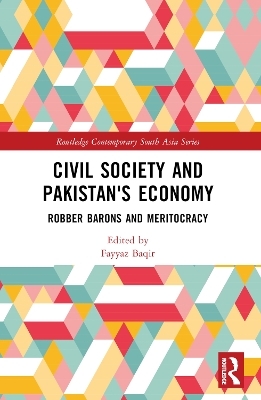
Civil Society and Pakistan's Economy
Routledge (Verlag)
978-1-032-29953-2 (ISBN)
This book analyses the paradoxes of Pakistan’s economy, meritocratic domestic policy, and the role of the state and the civil society. It argues that the transition in the county’s foreign policy from geo-politics to geo-economic depends on a fundamental domestic policy transition from kleptocracy to meritocracy.
Civil Society and Pakistan’s Economy discusses how the prevalence of rent-seeking practices has undermined merit-based practices by increasing the cost of doing business and converting public loss into private profit by awarding inappropriate subsidies and imposing regressive taxes. The analyses are supported by describing the instruments and mechanisms used for rent-seeking practices and the creation of public awareness of options available to change these practices through citizen’s action and civil society engagement. The book also shows the path of transformation and the role of participation and argues that aspiring for and capturing power is not the only way to transform Pakistan.
A novel analysis depicting macro-micro linkages of encroachment of socio-economic space by the power elites and effective strategies used for its reappropriation by the people, the book will be of interest to academics researching South Asian Studies, in particular South Asian economics and politics.
Fayyaz Baqir is a Development Practitioner and a visiting scholar at the University of Ottawa, Canada. He served as senior advisor on civil society at the United Nations and CEO of Trust for Voluntary Organizations. He received top contributors’ awards from the UNDP’s global poverty reduction network.
Introduction; Chapter 1 Economic vision of Pakistani elites and challenges of transition from patronage to participatory practices; Chapter 2 Politics of constitution making in Pakistan: Why religion and authoritarianism are hands in glove?; Chapter 3 Development and Planning Administration: Where checks and balance fail?; Chapter 4 Management of resources and revenues: transformation or regression?; Chapter 5 Incidence of Taxes: Who bears how much burden?; Chapter 6 Pakistan’s Achilles’ Heel: under allocation, underspending or underperformance?; Chapter 7 Feminist Discourse and rent seeking under patriarchy; Chapter 8 Non-profit sector and Informal economy: entrepreneurial spirit in action; Chapter 9 Digital Economy, entrepreneurship, and innovation; Chapter 10 Globalization, Global Jihad and Civil Society; Chapter 11 Limitations of the political discourse
| Erscheinungsdatum | 13.03.2023 |
|---|---|
| Reihe/Serie | Routledge Contemporary South Asia Series |
| Zusatzinfo | 16 Tables, black and white; 9 Line drawings, black and white; 9 Illustrations, black and white |
| Verlagsort | London |
| Sprache | englisch |
| Maße | 156 x 234 mm |
| Gewicht | 453 g |
| Themenwelt | Sozialwissenschaften ► Ethnologie |
| Sozialwissenschaften ► Soziologie ► Spezielle Soziologien | |
| Wirtschaft ► Volkswirtschaftslehre | |
| ISBN-10 | 1-032-29953-3 / 1032299533 |
| ISBN-13 | 978-1-032-29953-2 / 9781032299532 |
| Zustand | Neuware |
| Haben Sie eine Frage zum Produkt? |
aus dem Bereich


